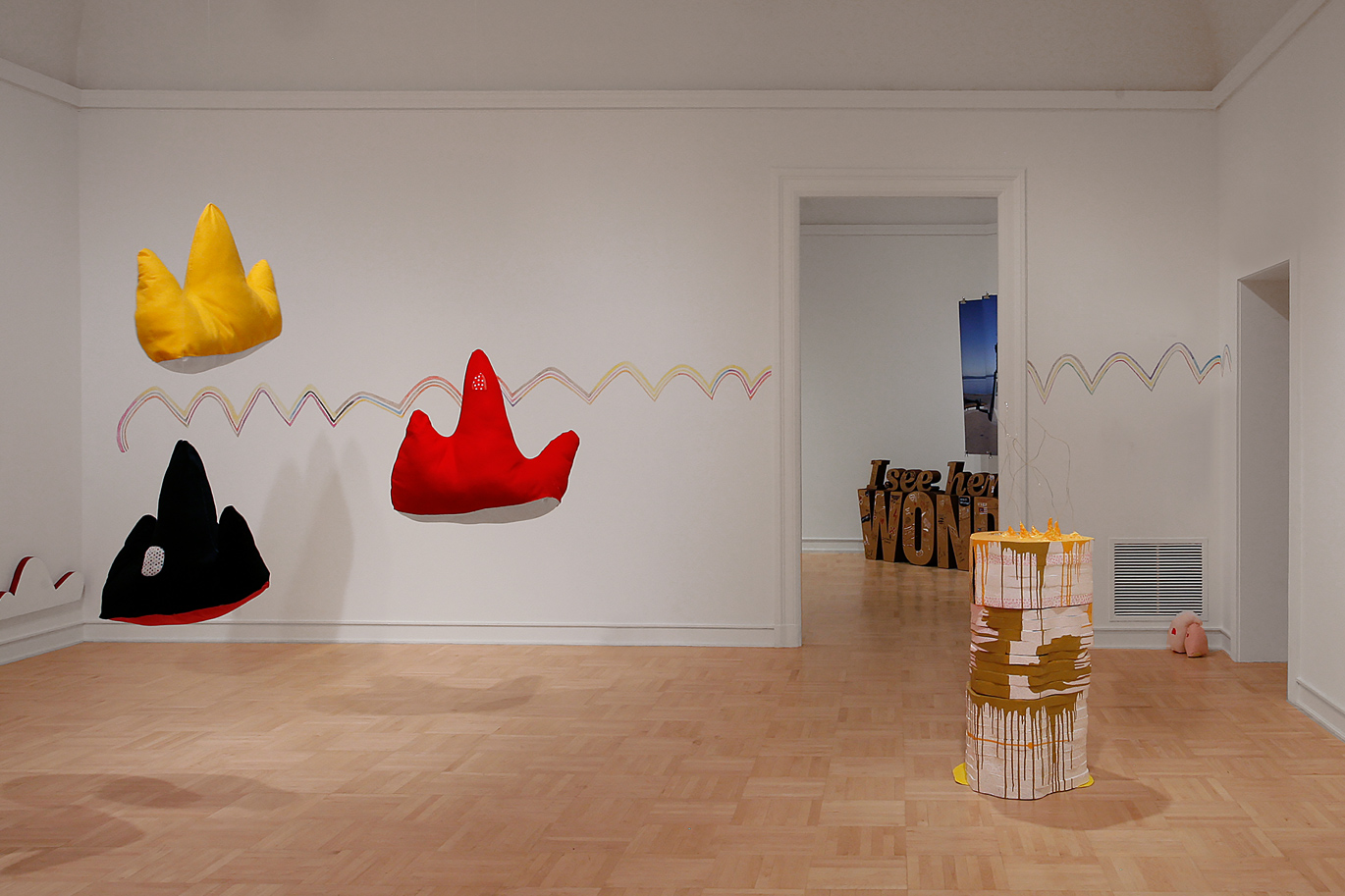The Avant-Garde’s Critical Heritage across the Arts and Humanities
- Autumn 2022
Syllabus Description:
The Avant-Garde’s Critical Heritage across the Arts and Humanities

Asger Jorn, L’avant-garde se rend pas
(The avant-garde does not surrender),
1962, oil on canvas (on found painting)
Instructor: Marek Wieczorek
W 2:30pm - 5:20pm
Art 312
Office: 355 Art building—marek@uw.edu
Office hours: W 5:30-6:30pm
The premise of this interdisciplinary graduate seminar is that the avant-garde is very much alive today, not only across different artistic disciplines and forms, such as the visual arts, music, performance, film, literature and poetry, but also in the humanities, where its critical heritage is felt and promoted through retellings and through the recognition of its progressive potential and sometimes model function for the advancement of critical theories. The avant-garde has been both celebrated and critiqued in relation to its militant roots (advance guard or vanguard), its association with things strident, at the forefront, “ahead of the pack.” For some the notion has become so capacious as to lose its value as a useful or critical term. In recent writing it has also made something of a comeback, however, and thus reasserted its presence and urgency in all manner of artistic expressions and forms of activism. In this seminar, we will trace the origins and shifting meanings of the notion of the avant-garde, from its first emergence in mid nineteenth-century France in the writings of utopian socialist and anarchist thinkers all the way to present-day manifestations among artists of the global South.
During the first few weeks, we will gradually build up a critical vocabulary by examining various manifestations of avant-garde theory and practice, from the early twentieth-century “historical” avant-gardes (Cubism, Futurism, Abstraction, Dadaism, Constructivism, Surrealism), via “neo-avant-gardes” of the 1950s and 60s, up to recent re-appropriations of various critical strategies devised by indigenous artists and those previously dispossessed and excluded from the global artworld (predominantly artists associated with the global South). Their appearance and recognition in the global artworld owes much to the proliferation of critical discourse by native and postcolonial thinkers and the emergence of Critical Heritage Studies, which examines the relationship between people and tangible and intangible heritage for its value in the present. Although the notion of the avant-garde is commonly associated with the visual arts, its earliest uses already encompassed all the arts, which is why we will put emphasis on the interdisciplinary nature of many of its expressions. UW faculty from different disciplines, such as Film, Performance studies and Literary Studies, will be invited to share their views on the currency of the avant-garde in today’s cultural climate.
Students will be expected to participate actively in discussions and to develop a research project on a topic of their choice. You are also encouraged to explore unconventional—e.g. critical and imaginative, activist and creative—forms of scholarship in order to seek connections with decolonial practices in museums, universities and other institutions of culture and learning, provided this is done in the spirit of the UW’s commitment to DEI + A (Diversity, Equity, Inclusivity + Accessibility) and involves a writing component. Recent attention to decolonial practices in museums and the university, coupled with earlier attempts at decanonizing art history and its Western foundations, have reestablished and fortified links between the arts and politics, specifically art as a response to different forms of violence, such as displacement, war, genocide, or conflicts defined along religious, ethnic, linguistic, raced, classed, and gendered lines. How do artists, especially indigenous artists and those from the global South, assert location and native epistemologies and ontologies, that is, forms of knowing and being, in the face of the upheavals wrought by globalization and climate change?
The seminar will attempt to work through tensions inherent in the juxtaposition of different temporalities, for example between the Western roots of avant-garde strategies, including the shift toward “primitivism,” and the idea of heritage, which does not at first appear as progressive. Yet, because certain areas of heritage studies have recently undergone a shift toward critical heritage, the study and affirmation of ongoing political, socio-cultural and economic processes emerge as contemporary and involve identity beyond the local or national, thus becoming global contemporary in their concern with heritage justice. As art historian David Joselit argues in Heritage and Debt: Art in Globalization (2020), heritage in art, in becoming contemporary critical heritage, has progressive potential and the means to uproot entrenched hierarchies while participating in forms of “cognitive justice” (the term comes from Boaventura de Sousa Santos). In this sense, engaging with global contemporary art and the avant-garde’s critical heritage uproots established hierarchies and paradigms and asks of us viewers to become newly aware of innovative, critical forms of representation.
-
Equal Opportunity
The School of Art reaffirms its policy of equal opportunity regardless of race, color, creed, religion, national origin, gender, sexual orientation, age, marital status, disability, or status as a disabled veteran or Vietnam-era veteran in accordance with UW policy and applicable federal and state statutes and regulations.
Student Health + Wellness Resources:
- UW Counseling Center offers multiple options for students seeking help coping with stress and mental health concerns.
- The Counseling Center is open M - F, 9am - 4pm, 206-543-1240, https://www.washington.edu/counseling/
- SafeCampus is dedicated to supporting anyone at the UW dealing with potentially difficult or dangerous situations including, but not limited to: resolving conflict, addressing concerning & prohibited behaviors, suicide / self harm, relationship violence
- Contact SafeCampus with any issues of concern 24/7 at 206-685-SAFE, http://www.washington.edu/safecampus
- Urgent Help Options for medical & mental health are available to students through UW and several off-campus organizations: https://wellbeing.uw.edu/mental-health/urgent-help/
Access and Accommodations
Your experience in this class is important to me. If you have already established accommodations with Disability Resources for Students (DRS), please communicate your approved accommodations to me at your earliest convenience so we can discuss your needs in this course.
If you have not yet established services through DRS, but have a temporary health condition or permanent disability that requires accommodations (conditions include but not limited to; mental health, attention-related, learning, vision, hearing, physical or health impacts), you are welcome to contact DRS at 206-543-8924 or uwdrs@uw.edu or disability.uw.edu. DRS offers resources and coordinates reasonable accommodations for students with disabilities and/or temporary health conditions. Reasonable accommodations are established through an interactive process between you, your instructor(s) and DRS. It is the policy and practice of the University of Washington to create inclusive and accessible learning environments consistent with federal and state law.
Washington state law requires that UW develop a policy for accommodation of student absences or significant hardship due to reasons of faith or conscience, or for organized religious activities. The UW’s policy, including more information about how to request an accommodation, is available at Religious Accommodations Policy
Accommodations must be requested within the first two weeks of this course using the Religious Accommodations Request Form
SoA+AH+D Policies: The current Policies document is available from the School’s Teaching Resources page
SoA+AH+D Advising: Current UW students can schedule Zoom or In Person Advising appointments (schedule online here), or stop by Art Rm 104 for drop-in advising, available Monday - Thursday, 9am - 3pm. Students can also email Advising at uaskart@uw.edu
Covid Health + Safety Information:
o Covid-19 Prevention Plan for the School of Art + Art History + Design
o UW Covid-19 Face Covering Policy
o What Do I Do If I Feel Sick?
Land Acknowledgment: I would like to acknowledge that I live and work in Salish territory, specifically the lands of the Suquamish and Duwamish and the shared lands and waters of the Tulalip and Muckleshoot. There is a long history of education on this land dating to long before the establishment of this university. I encourage the University to promote respect for and engagement with Indigenous ways of knowing tied to the lands and people of this region. I encourage everyone to learn about and amplify the contemporary work of the Indigenous nations whose land you are on and to endeavor to support Indigenous sovereignty in all the ways that you can.
- UW Counseling Center offers multiple options for students seeking help coping with stress and mental health concerns.



